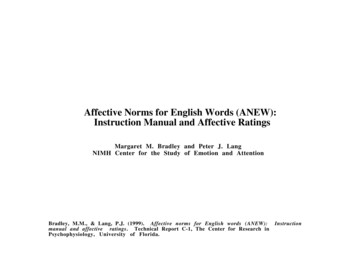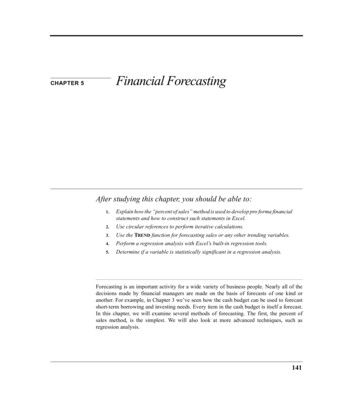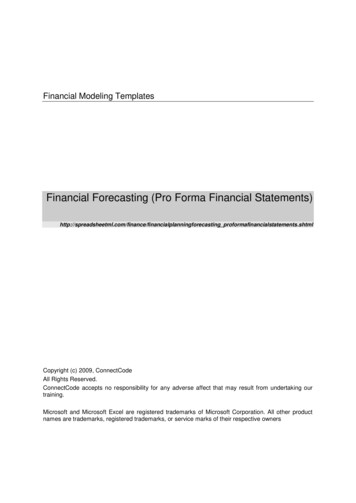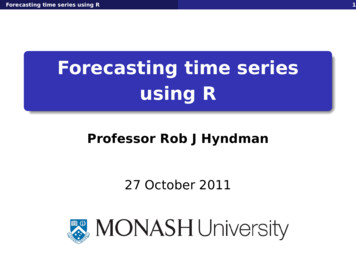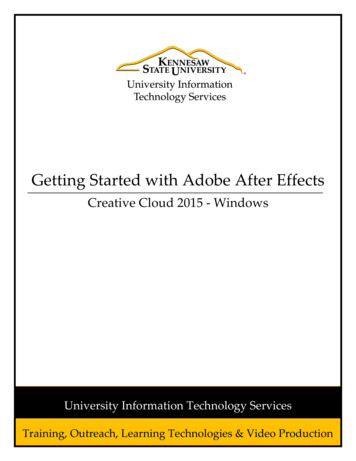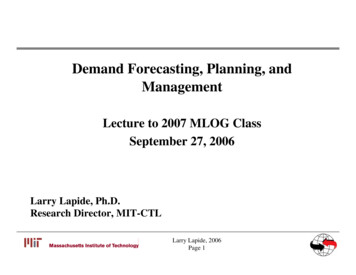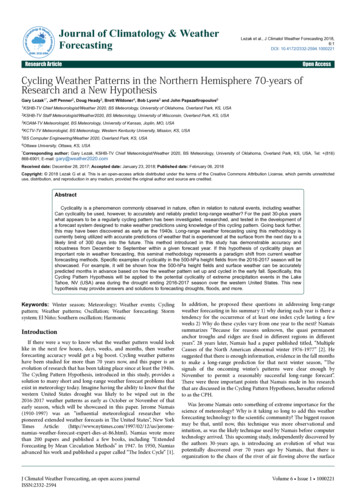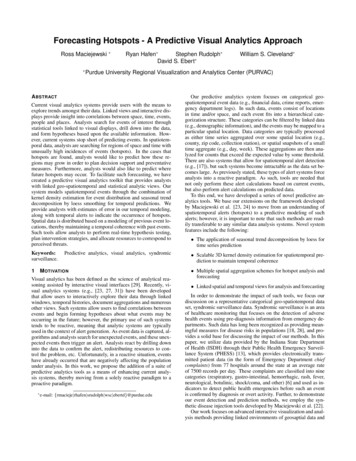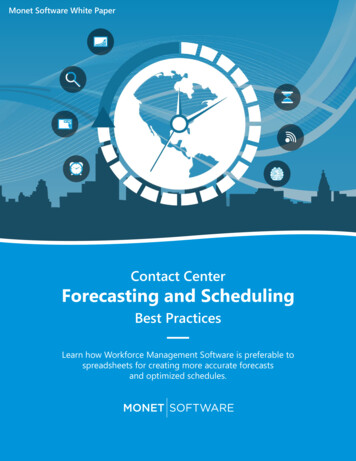
Transcription
AFFECTIVE FORECASTING: THE EFFECTS OF IMMUNENEGLECT AND SURROGATIONSummer Dae Burkman, B.S., M.S.Dissertation Prepared for the Degree ofDOCTOR OF PHILOSOPHYUNIVERSITY OF NORTH TEXASAugust 2012APPROVED:Charles A. Guarnaccia, Major ProfessorRandall J. Cox, Committee MemberC. Edward Watkins, Committee MemberVicki Campbell, Chair of the Department ofPsychologyMark Wardell, Dean of the Toulouse GraduateSchool
Burkman, Summer Dae, Affective Forecasting: The Effects of Immune Neglect andSurrogation. Doctor of Philosophy (Clinical Psychology), August 2012, 149 pp., 4 tables,references, 114 titles.Studies of affective forecasting examine people’s ability to predict (forecast) theiremotional (affective) responses to future events. Affective forecasts underlie nearly all decisionspeople make and the actions they take. However, people engage in systematic cognitive errorswhen making affective forecasts and most often overestimate the intensity and duration of theiremotional responses. Understanding the mechanisms that lead to affective forecasting errors(e.g., immune neglect) and examining the utility of methods for improving affective forecastingerrors (e.g., surrogation) can provide highly valuable information for clinicians as they assistclients in determining their goals both for therapy and for life. The first purpose of the currentstudy was to determine if affective forecasting errors due to immune neglect lead tomisjudgments about the relative emotional impact of minor versus moderate negativeexperiences (i.e., trauma severity). The second purpose was to examine the utility of surrogationfor improving affective forecasts. Potential interaction effects between these two variables werealso examined. The current study utilized a 2 (Trauma Severity: minor, moderate) X 3(Prediction Information: surrogation information only, simulation information only, both types ofinformation) experimental design. Undergraduates were recruited via the SONA system andrandomly assigned to one of the six experimental conditions. A preliminary study was conductedto obtain surrogation information for use in the main study. All participants in the main studypredicted how they would feel 10 minutes after receiving negative personality feedback, using a10-point scale ranging from (1) very unhappy to (10) very happy. These predictions constitutetheir affective forecasts. All participants then actually received the negative personality feedback
(ostensibly from another participant, a peer, in a nearby room) and reported their actual affectivestates ten minutes later, using the same scale. These ratings constitute their affective reports.Affective forecasting error was calculated as the difference between affective forecasts andaffective reports. Results showed the affective forecasts of participants in the moderate traumaseverity condition were significantly less accurate than those of participants in the minor traumaseverity condition, providing evidence of immune neglect. Surrogation information significantlyimproved the accuracy of affective forecasts when participants were deprived of simulationinformation. Limitations of the current study and implications of the findings are discussed.
Copyright 2012bySummer Dae Burkmanii
ACKNOWLEDGMENTSI wish to express my deep appreciation and gratitude for Dr. Russell Clark III, who was adedicated and enthusiastic mentor. I would like to thank Dr. Charles A. Guarnaccia for hisunwavering support as major professor and Dr. Randall J. Cox for his encouragement as advisorand committee member. I would also like to thank Mariana Garza for assisting in data collection.iii
TABLE OF CONTENTSPageACKNOWLEDGMENTS . iiiLIST OF TABLES . viiINTRODUCTION . 1Affective Forecasting . 1The Impact Bias . 4Major Causes of the Impact Bias . 8Focalism . 8Failure to Account for Affective Adaptation . 14Psychological Immune System . 16Immune Neglect . 17Implications of Immune Neglect . 20Illusion of External Agency . 20Misjudgments about the Relative Impact of Trauma Severity . 28Efforts to Improve Affective Forecasting . 36Defocusing Tasks . 36Adaptation Exercises . 41Mental Simulation: A Common Element in Affective Forecasting Errors. 45Surrogation: An Antidote for Affective Forecasting Errors? . 47CURRENT STUDY. 61PART 1: PRELIMINARY STUDY . 67Method . 67Overview . 67Participants . 67Materials . 68Informed Consent Form . 68Personality Descriptions . 69Self Evaluation Form . 70Story Form . 71iv
Peer’s Story . 71Peer Evaluation Form . 71Personality Feedback . 72Affective Report Form . 72Demographic Questionnaire . 72Debriefing Form. 73Procedure . 73Results . 76PART 2: MAIN STUDY . 77Method . 77Overview . 77Participants . 78Materials . 79Informed Consent Form . 79Personality Descriptions (Simulation Information) . 79Affective Report of a Previous Participant (Surrogation Information) . 80Affective Forecasting Forms. 80Self Evaluation Form . 82Affective Report Form . 82Research Participation Questionnaire . 82Additional Forms . 83Procedure . 83Results . 88Descriptive Statistics . 88Manipulation Check . 89Hypothesis Testing. 90Impact Bias . 90Trauma Severity (Forecasting Errors) . 91Trauma Severity (Affective Reports). 92Trauma Severity (Affective Forecasts) . 93Prediction Information . 94Interaction between Trauma Severity and Predication Information . 97v
Discussion . 100Impact Bias . 100Immune Neglect and the Relative Impact of Trauma Severity. 101The Utility of Surrogation for Improving Affective Forecasts . 104Additional Limitations of Current Study and Suggestions for Future Studies . 107APPENDIX A INFORMED CONSENT FORM . 109APPENDIX B PERSONALITY DESCRIPTIONS (SIMULATION INFORMATION) . 112APPENDIX C AFFECTIVE REPORT OF A PREVIOUS PARTICIPANT (SURROGATIONINFORMATION) . 115APPENDIX D AFFECTIVE FORECASTING FORM (SIMULATION INFORMATIONONLY CONDITIONS) . 117APPENDIX E AFFECTIVE FORECASTING FORM (SURROGATION INFORMATIONONLY CONDITIONS) . 119APPENDIX F AFFECTIVE FORECASTING FORM (BOTH TYPES OF INFORMATIONCONDITIONS) . 121APPENDIX G SELF EVALUATION Form . 123APPENDIX H STORY FORM . 125APPENDIX I PEER'S STORY. 127APPENDIX J PEER EVALUATION FORM . 129APPENDIX K PERSONALITY FEEDBACK . 131APPENDIX L AFFECTIVE REPORT FORM . 133APPENDIX M DEMOGRAPHIC QUESTIONNAIRE. 135APPENDIX N RESEARCH PARTICIPATION QUESTIONNAIRE. 137APPENDIX O DEBRIEFING FORM . 139REFERENCES . 141vi
LIST OF TABLESPageTable 1 Descriptive Statistics of Dependent Variables. 89Table 2 Means and Standard Deviations for Dependent Measures by Trauma Severity Condition. 94Table 3 Means and Standard Deviations for Dependent Measures by Prediction InformationCondition. 97Table 4 Means and Standard Deviations for Dependent Measures by Experimental Condition. 98vii
INTRODUCTIONImagine yourself in the following situations: You are watching the last play of the SuperBowl and it will determine whether your favorite football team wins the game. You are about tofind out if the presidential candidate you voted for wins or loses the election. You scratch off alottery ticket and win a big payout. You receive an award for outstanding employee of the year.Your fiancé or spouse dumps you. You are denied tenure. You are a graduate student who hasapplied for internship and you match with your first choice.In each of these cases, people predict strong emotional reactions to upcoming events thatwill leave them with feelings of long-lasting elation or prolonged devastation. The literature doesnot support this. Research on affective forecasting indicates that our ability to correctly predictour emotional responses to future events is deeply flawed.Affective ForecastingStudies of affective forecasting examine people’s ability to predict (forecast) theiremotional (affective) responses to future events (for overviews, see Gilbert, Driver-Linn, &Wilson, 2002; Loewenstein & Agner, 2003; Loewenstein & Schkade, 1999; Wilson & Gilbert,2003; Wilson & Gilbert, 2005). We are all motivated to maximize our happiness. We want toexperience positive emotions and we want to avoid negative emotional experiences. Thedecisions we make and the actions we take are based on what we believe will ultimately bring usthe most pleasure and/or allow us to avoid the most pain. However, our ability to predict ourhedonic reactions to future events is quite flawed, and, as it turns out, we are rarely as pleased ordispleased with our outcomes as we imagined we would be (Wilson & Gilbert, 2003).In regard to the accuracy of affective forecasts, Wilson and Gilbert (2003) have identified1
four facets of emotional responses to consider: valence, specificity, intensity, and duration. Whenmaking predictions regarding the valence of an emotional response, we ask ourselves thequestion, “will this make me feel good or will this make me feel bad?” When predicting thespecificity of an emotional response, we ask ourselves “will this make me feel happy, proud,amused, or a combination of all three?” or “will this make me feel sad, afraid, angry, or acombination of all three?” When predicting intensity and duration, we ask ourselves thequestions “how good or how bad will I feel?” and “how long will I feel good or bad?”According to Wilson and Gilbert (2003), we are adept at making predictions about thevalence of our emotional responses. We know that, in general, getting a raise is likely to make usfeel good, while getting fired is likely to make us feel bad. Yes, that first drive in our brand newMercedes will be a positive emotional experience and, yes, finding that first scratch on our brandnew Mercedes will be a negative emotional experience. We get it. A lower score on our golfgame is good. A lower score on our credit report is bad.When predicting our emotional responses, we also need to determine the specificemotions we are likely to experience. In most cases, people tend to be quite accurate in regard topredicting the specificity of their emotional responses. For example, in a study by Robinson andClore (2001), participants were shown several emotion-provoking photographs and rated theirreaction on 20 separate scales of emotion. Before participants were actually shown the photos,they were given written descriptions of them and used the same 20 scales to predict what theiremotional reactions would be. Results indicated participants were quite accurate in theirpredictions that they would be disgusted by the photo of a filthy toilet and would experiencemore fear when presented with a photo of a snarling wolf than when presented with a photo oflovers kissing.2
However, individuals are sometimes overly simplistic when predicting the specificity oftheir emotional responses to complex social situations and fail to account for the precise blend ofboth the negative and positive emotions they will experience. For instance, when collegestudents imagine their day of graduation, they may focus on the emotions of pride and joy, whilefailing to consider the feelings of apprehension about finding a job or the feelings of sadnessabout leaving friends behind (Larsen, McGraw, & Cacioppo, 2001).A study by Woodzicka and LaFrance (2001) demonstrated how failing to account for thecomplex nature of a social situation can lead individuals to error in their prediction of thedominant emotion they will experience. The researchers provided female participants with adetailed description about a job interview and asked them to predict how they would feel if theywere asked a set of specific questions considered to be sexually harassing. The women predictedthat their predominant emotion would be anger and that they would experience only a minoramount of fear. However, when women were asked the sexually harassing questions in reality,during an actual job interview, fear was the predominate emotion experienced and only a fewreported feelings of anger.Although people are very adept at predicting the valence of their emotional responses tofuture events and are often accurate when predicting the specificity of the emotions they willexperience, people perform poorly when predicting the intensity and duration of future emotionalreactions (Wilson & Gilbert, 2003). Individuals almost always overestimate the intensity andduration of their emotional reactions to future events. For example, people are likely to believethat getting fired will leave them feeling disgruntled and anguished, whereas they expect winninga Hawaiian vacation to bring joy and excitement into their lives. However, as we shall see, such3
events are most certain to be less anguishing (or joyful) than we anticipate and our anguish (orjoy) will fade sooner than we anticipate.The Impact BiasThe most pervasive systematic error demonstrated in studies of affective forecasting isthe tendency for people to overestimate the intensity and duration of their emotional reactions tofuture events. This tendency is termed the impact bias (Gilbert, Driver-Linn, et al., 2002). Sincethe initial demonstration of this affective forecasting error (Gilbert, Pinel, Wilson, Blumberg, &Wheatley, 1998), dozens of studies have been conducted, by an increasing number ofinvestigators, in both the laboratory and field. The impact bias has been demonstrated with manydifferent populations (e.g., college students, university professors, voters, sports fans, dieters,medical patients) and across a wide range of minor and major events, both positive and negative(e.g., romantic breakups, relocations, personal insults, sports victories, electoral defeats, winningprizes, failing exams, learning results of HIV tests). For reviews of the impact bias, see Frederick& Loewenstein, 1999; Gilbert, Driver-Linn, et al., 2002; Loewenstein & Schkade, 1999; Wilson& Gilbert, 2003; Wilson & Gilbert, 2005.In an early study of affective forecasting, Gilbert et al. (1998) examined the commonbelief among university faculty (assistant professors) that tenure decisions would have a strongimpact on their long-term happiness. The professors predicted they would be happy if they didreceive tenure and unhappy if they did not. Actual happiness ratings obtained later showed thatprofessors who did not receive tenure during the past few years were just as happy as those whohad.4
Additional studies conducted by Gilbert et al. (1998) demonstrated that voters in agubernatorial election significantly overestimated how unhappy they would be a month afterlearning that their candidate lost. They also demonstrated that college students significantlyoverestimated how unhappy they would feel a few minutes after being rejected for a desirablejob and overestimated how unhappy they would be 2 months following the break-up of aromantic relationship.Other researchers of affective forecasting have provided further evidence of the impactbias. Buehler and McFarland (2001) demonstrated that college students overestimated theemotional impact of receiving an unexpectedly high or an unexpectedly low exam grade. A studyconducted by Mellers, Schwartz, and Ritov (1999) showed that dieters overestimated howunhappy they would feel following a setback. The results of a study by Sieff, Dawes, andLoewenstein (1999) revealed that people waiting for HIV test results overestimated how happythey would feel 5 weeks after receiving favorable results and overestimated how unhappy theywould feel 5 weeks after receiving unfavorable results.Mellers and McGraw (2001) conducted several studies on predicted emotional responses,including the anticipation of course grades, weight loss, and pregnancy test results. Students inan introductory psychology course predicted their emotional reactions to all possible grades forthe course and then rated their emotional responses when they received their actual grade thefollowing quarter. People engaged in a commercial weight-loss program predicted their feelingsin response to achieving or failing to achieve their weight-loss goals and then rated their actualemotions a week after receiving information about their weight changes. Women waiting forpregnancy test results at Planned Parenthood predicted their emotional responses to finding outwhether they were pregnant and then reported their actual emotions 10 minutes later, after5
receiving their test results. In all of these studies, predicted emotional responses weresignificantly stronger than actual emotional responses.Wilson, Wheatley, Meyers, Gilbert, and Axsom (2000) found that college sports fansoverestimated how happy (or unhappy) they would feel after their favorite team won (or lost) afootball game. Just a few days after the game, no differences in happiness between supporters ofwining and losing teams were observed.Dunn, Wilson, and Gilbert (2003) demonstrated that college students vastlyoverestimated how happy or unhappy they would be after being assigned to a desirable orundesirable dormitory. A year after predicting that their dormitory assignment would have agreat impact on their overall happiness, students living in both the undesirable and desirabledormitories were at nearly identical levels of happiness.People do realize that their emotional responses will lessen with time. However, theysignificantly underestimate how fast their emotions will fade (Finkenauer, Gallucci, Van Dijk, &Pollmann, 2007). As an illustration, consider a famous study in the literature on psychologicalwell-being by Brickman, Coates, and Janoff-Bulman (1978) which showed that, after just 1 year,the happiness levels of lottery winners were nearly identical to the happiness levels of normalcontrol subjects. Furthermore, this study found only slight differences in life satisfaction betweenaccident victims, who had become paraplegic during the previous year, and normal controlsubjects.The findings of this provocative study have been supported by subsequent research.People are more resilient than they think. For example, Wortman, Silver, and Kessler (1993)found that 30% of parents who had babies that died as a result of sudden infant death syndromenever experienced significant depression. Lund, Caserta, and Diamond (1989) found that 82% of6
bereaved spouses were well-adjusted within 2 years after the death of their spouse and Suh,Diener, and Fujita (1996) reported that the frequency of positive affect returns to normal levelswithin a year after the death of a loved one. Similarly, studies have shown that healthy people(i.e., non-patients) consistently overestimate how unhappy they would be in various states of illhealth (Menzel, Dolan, Richardson, & Olsen, 2002; Ubel, Loewenstein, & Jepson 2003). Theseindividuals also tend to believe that having a disability will have a greater impact on their qualityof life than is reported by disabled individuals (Riis et al., 2005; Smith, Sherriff, Damschroder,Loewenstein, & Ubel, 2006; Ubel, Loewenstein, Schwarz, & Smith, 2005).Suh et al. (1996) studied the relationship between the subjective well-being of collegestudents and the number of life events they had experienced in the previous 4 years. Theyreported only modest correlations between subjective well-being and the number of life events(positive or negative) the student had experienced in the previous 3 months. No correlation wasfound between subjective well-being and the number of life events experienced in the past 6months. These findings led Suh et al. (1996, p.1091) to the conclusion that “only recent eventsmatter.” People tend to adapt emotionally to both positive and negative events much faster thanthey expect. Thus, the more recent an event has occurred, the more likely it is to still beimpacting our emotional state. However, even recent events have less of an emotional impactthan we expect them to.All of these studies provide ample evidence in regard to the pervasiveness of the impactbias. This is not to suggest that life events have no impact on us. Of course they do. Finding amillion dollars would be awesome. Furthermore, it would be perverse to suggest that tragicevents, such as rape or the death of a child, have little emotional consequence. In some cases, theemotional consequences of such tragic experiences may last for years, if not a lifetime. However,7
what these studies do show is that the impact of events, whether truly terrific or profoundlytragic, is demonstrably smaller and less enduring than we expect them to be.Major Causes of the Impact BiasResearch has focused on two major causes of the impact bias. The first major cause of theimpact bias is focalism (Wilson et al., 2000), which refers to people’s failure to anticipate theextent to which other, unrelated, events will also occupy their thoughts and influence theiremotions. The second major cause of the impact bias is people’s failure to account for theprocesses of affective adaptation, which attenuate emotional responses to both positive andnegative events (Gilbert et al., 1998; Wilson & Gilbert, 2008).FocalismOne major cause of the impact bias is focalism: people’s tendency to overestimate theimpact that one event - or one aspect of an event - will have on their overall sense of well-being(Loewenstein & Frederick, 1997; Schkade & Kahneman, 1998; Ubel, Loewenstein, & Jepson,2005; Wilson et al., 2000). In a simple demonstration of focalism, Schwarz (1996) asked collegestudents two questions: “How happy are you?” and “How many dates did you have last month?”The correlation between these questions was dependent on the order in which they were asked.When the question about happiness was asked first, the correlation was .12. When the questionabout dating was asked first, the correlation was .66. By focusing on dating first, participantsshowed a significant increase in how much they believed that one aspect of life would dominatetheir overall emotional well-being.8
Focalism leads to affective forecasting errors in two ways. First, when predictingemotional responses to a specific future event, people pay too much attention to the event inquestion (the focal event) and underestimate the extent to which other events will influence theirthoughts and feelings (Wilson et al., 2000). Secondly, when predicting their emotional responsesto alternative events, people focus on the differences between the outcomes and ignore theimpact that the common factors will have on their affective states (Dunn et al., 2003; Schkade &Kahneman, 1998). These two types of error are discussed below.The first type of error due to focalism is relevant when people are contemplating howtheir emotional lives will be impacted by the occurrence of a specific future event, such as theoutcome of a sporting event (“I’ll be ecstatic if the Cowboys win the Super Bowl”). People tendto focus on that one event in isolation. However, such events do not occur in a vacuum, butwithin the rich contexts of our lives, which happen to be filled with many other events that alsocapture our attention and influence our emotions. Even the most devoted Tony Romo fans haveother thin
Burkman, Summer Dae, Affective Forecasting: The Effects of Immune Neglect and Surrogation. Doctor of Philosophy (Clinical Psychology), August 2012, 149 pp., 4 tables, references, 114 titles. Studies of affective forecasting examine people’s ability to predict (forecast) their emotional
